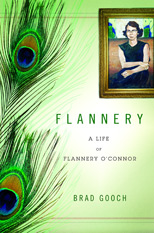Each day leading up to the March 11 announcement of the 2009 NBCC awar d winners, Critical Mass highlights one of the thirty finalists. Today, NBCC board member Mary Ann Gwinn discusses biography finalist Brad Gooch's Flannery: A Life of Flannery O'Connor (Little, Brown)
d winners, Critical Mass highlights one of the thirty finalists. Today, NBCC board member Mary Ann Gwinn discusses biography finalist Brad Gooch's Flannery: A Life of Flannery O'Connor (Little, Brown)
The name Flannery O’Connor generates a vague notion of an oddball Southern literary saint who lived out her hermetic life in a small Georgia town, keeping company with eccentrics, crafting her art in splendid isolation until her martyr-like death of lupus at age 39.
Brad Gooch’s comprehensive biography Flannery: A Life of Flannery O’Connor gets beyond this iconic image. Flannery O’Connor was certainly an oddball, and a bred-in-the-bone Southerner, but in her brief life she shared her luminous intellect with some of the literary world’s most incandescent personalities. She developed her art both at the Iowa Writers Workshop and Yaddo and conducted a lifelong correspondence with some of the best writers and thinkers of the era.
Flannery documents the writer’s cosseted youth in Savannah and her move as a teenager to Milledgeville, Georgia, the locus of O’Connor’s life and literature. The young college graduate left Milledgeville to attend graduate school in journalism at the Universityof Iowa.
What luck for her readers that, shortly after her arrival, she walked into the office of Iowa Writers Workshop director Paul Engle and said in a thick Southern accent: “ ’My name is Flannery O’Connor. I am not a journalist. Can I come to the Writers’ Workshop?’ Engle suggested that she drop off writing samples…the next day a few stories arrived, and to his near disbelief, he found them to be ‘imaginative, tough, alive.’ ”
After Iowa, she was accepted at Yaddo, the Saratoga Springs writers retreat, where she shared the table with the likes of Patricia Highsmith and Robert Lowell (oh, to have been a fly on the wall for those dinner conversations). O’Connor, a devout Catholic, avoided the customary heavy drinking and partying, spending her days deep in writing, reading and thinking. Aided by Lowell’s introductions, she eventually moved to New York. She was living happily in a garage apartment at the Connecticut home of friends Bob and Sally Fitzgerald when, feeling poorly, she went home to Milledgeville to get a complete physical exam. She learned at age 25 that she lupus, the same disease that had killed her father.
So Flannery went south, and home to her mother’s farm. But her writing only became richer and deeper, darkly comic and thematically Catholic. Her mother took care of her, and if Flannery could no longer circulate among the literati, the literati came to her. She corresponded regularly with Caroline Gordon, Lowell, and the Fitzgeralds and wrote notes of encouragement and analysis to many aspiring writers. Mother and daughter entertained the distinguished likes of editor Robert Giroux, who reported that Flannery’s mother asked, “Mr. Giroux, can’t you get Flannery to write about nice people?”
Flannery could not. Her dark, grotesque and lyrical stories such as “The Life You Save May Be Your Own” sprang from the rural South, but they were informed by a world-view shaped by O’Connor’s devout Catholicism and extensive reading in philosophy. Some writers wither in isolation; it only deepened Flannery O’Connor’s art. She kept reading and writing, watching her peacocks from the front porch and battling her progressive disease, until her death in 1964. The Complete Stories of Flannery O’Connor won a posthumously awarded National Book Award in 1972.
Flannery gives us a complete accounting of the life of a writer whose work is alive and well for legions of readers and scholars today.
To read an extended interview with Brad Gooch from PBS's Religion and Ethics NewsWeekly, click here.


